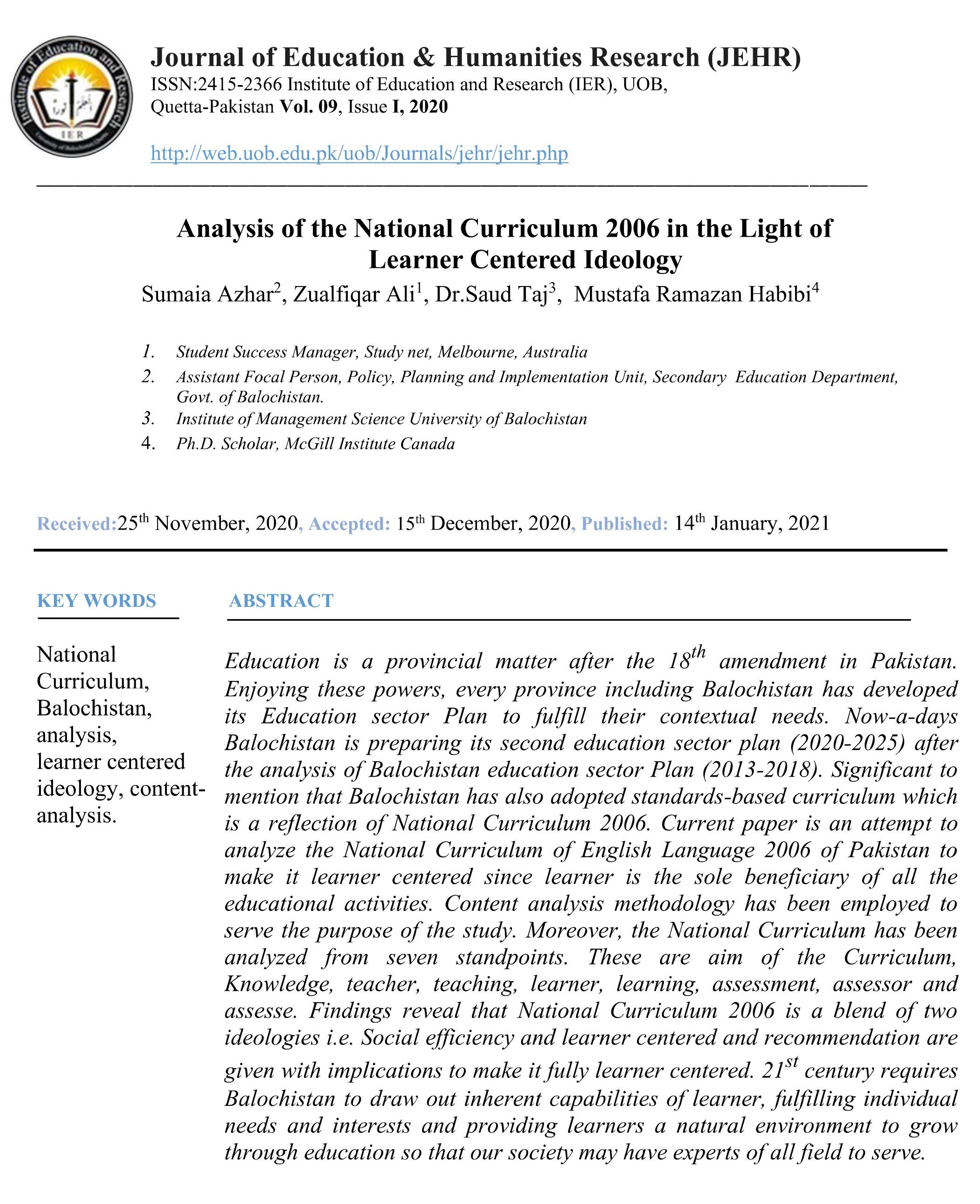Analysis of the National Curriculum 2006 in the Light of Learner Centered Ideology
Keywords:
National Curriculum, Balochistan, analysis, learner centered ideology, content-analysis.Abstract
Education is a provincial matter after the 18th amendment in Pakistan. Enjoying these powers, every province including Balochistan has developed its Education sector Plan to fulfill their contextual needs. Now-a-days Balochistan is preparing its second education sector plan (2020-2025) after the analysis of Balochistan education sector Plan (2013-2018). Significant to mention that Balochistan has also adopted standards-based curriculum which is a reflection of National Curriculum 2006. Current paper is an attempt to analyze the National Curriculum of English Language 2006 of Pakistan to make it learner centered since learner is the sole beneficiary of all the educational activities. Content analysis methodology has been employed to serve the purpose of the study. Moreover, the National Curriculum has been analyzed from seven standpoints. These are aim of the Curriculum, Knowledge, teacher, teaching, learner, learning, assessment, assessor and assesee. Findings reveal that National Curriculum 2006 is a blend of two ideologies i.e. Social efficiency and learner centered and recommendation are given with implications to make it fully learner centered. 21st century requires Balochistan to draw out inherent capabilities of learner, fulfilling individual needs and interests and providing learners a natural environment to grow through education so that our society may have experts of all field to serve.
References
Ministry of Education, Govt. of Pakistan (2006). National curriculum for English language. Islamabad, Pakistan: Ministry of Education.
Schiro, M. (2013). Introduction to the Curriculum Ideologies. In Curriculum theory: Conflicting visions and enduring concerns (pp. 1-13). Thousand Oaks, Calif: SAGE Publications.
Jamil, B. R. (2009). Curriculum reforms in Pakistan – A glass half full or half empty? Retrieved from website: http://itacec.org/document/nep09/NCERT%20Pakistan%20paper%20BRJ.pdf
ASCD (2012). Fulfilling the promise of the common core state standards: moving from adoption to implementation to sustainability. Retrieved from Alexandria, USA. Website: www.ascd.org/ASCD/pdf/.../commoncore/CCSSSummitReport.pdf
Bromley, D. W. (1990). The ideology of efficiency: searching for a theory of policy analysis. Journal of environmental economics and management, 19, 86-107. Retrieved from http://www.chatzilla.com/_Economics/BromleyTheIdeologyOfEfficiency.pdf
Association of teachers and lecturers (2005). A learners’ curriculum: towards a curriculum for the twenty-first century. Retrieved from Association of teachers and lecturers.Uk website: https://www.atl.org.uk/Images/A%20learner's%20curriculum.pdf
Writing @ CSU: Writing Guide (2004). An introduction to content analysis. Retrieved from http://www.umsl.edu/~wilmarthp/mrpc-web-resources/content-analysis.pdf
Walsh, G., Murphy, P., & Dunbar, C. (2009). Thinking skills in the early years: A guide for practitioners. Retrieved from Glenda Walsh Stranmillis University College, Stranmillis Road Belfast, U.K. website: http://www.nicurriculum.org.uk/TSPC/doc/getting_started/foundation/ThinkingSkillsin theEarlyYears_Report.pdf
Langer, J. A. (2002). Effective literature instruction develops thinking skills. Retrieved from National Research Center on English Learning & Achievement (CELA) University at Albany, ED-B9 State University of New York, sWashington, U.S.A website: http://www.albany.edu/cela/brief4.pdf
Shyamlee, S. D. (2012). “Use of Technology in English Language Teaching and Learning”: An Analysis. IPEDR, 33, 150-156. Retrieved from www.ipedr.com/vol33/030-ICLMC2012- L10042.Pdf
Blackboard K-12 (2010). Improving classroom learning. Retrieved from Blackboard Inc. Massachusetts Ave, NW, 6th Fl. Washington, DC, U.S.A website: https://www.blackboard.com/resources/k12/K12_Improving_Classroom_Learning.pdf
Jones, L. (2007). The student centered classroom. New York., U.S.A.: Cambridge University Press. Retrieved from http://www.cambridge.org/other_files/downloads/esl/booklets/Jones- Student- Centered.pdf
What is American literature? An overview. (2014). Retrieved from http://www.learner.org/amerpass/ampasspg3-30.pdf
Labaree, D. F. (2005). Progressivism, Schools and Schools of Education: An American Romance. Paedagogica Historica, 41(1), 275-288. DOI: 10.1080/0030923042000335583
Department for education and skills (2006). Learning outside the classroom manifesto. Retrieved from Published by the Department for Education and Skills, Nottingham, U.K. website: http://www.lotc.org.uk/wp-content/uploads/2011/03/G1.-LOtC- Manifesto.pdf
Powers, D. E. (2010). The Case for a Comprehensive, Four-Skill Assessment of English Language Proficiency. Retrieved from https://www.ets.org/Media/Research/pdf/TC-10- 12.pdf
Iahad, N.; Dafoulas, G.A.; Kalaitzakis, E.; Macaulay, L.A., (2004) "Evaluation of online assessment: the role of feedback in learner-
Centered E-learning," System Sciences, 2004. Proceedings of the 37th Annual Hawaii International Conference on, vol., no.pp.10 pp., 5-8 DOI : 10.1109/HICSS.2004.1265051URL: http://ieeexplore.ieee.org/stamp/stamp.jsp?tp=&arnumber=1265051&isnumber=28293
Gehringer, E., Ehresman, L., Conger, S. G., & Wagle, P. (2007). Reusable learning objects through peer review: The Expertiza approach. Innovate—Journal of Online Education, 3, 6.
Wood Daudelin, M. (1997). Learning from experience through reflection. Organizational dynamics, 24(3), 36-48.




